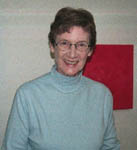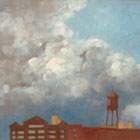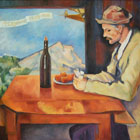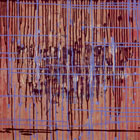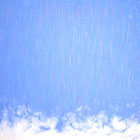LAURAYNE ROBINETTE
artwork | audio | statement | 2008 update | galleries
artwork
audio 
- Two kinds of work (25 sec. | 178KB): listen | read
- Abstract & painterly (41 sec. | 283KB): listen | read
- Visual statement (34 sec. | 237KB): listen | read
- Feel your way (42 sec. | 290KB): listen | read
- Aging (10 sec. | 84KB): listen | read
artist statement
The work is two-fold. Representational work is taken from observation; non-representational or abstract work is subjective, with use of various media to produce a visual statement without recognizable subject matter. I find satisfaction in both kinds of work. There is challenge in every undertaking: to keep the work from being merely a record of places/things observed or an echo of other art work. Rather, to make it a personal response to nature and the unseen.
2008 update
How has your life changed in the years since the interview?
I am ten years older and just a tiny bit less interested in being in my studio every day.
What kind of artwork are you doing now?
I am still doing two kinds of work: landscapes (with the Saturday Sketch Club) and other work done from observation and non-objective painting. My show titled Non-objective Retrospective was at the Des Moines Community Playhouse in May-June 2008.
How has your artwork changed in the last ten years?
Hopefully it has progressed, but if so I can't tell! My methods for painting non-objective work have changed somewhat, as I haven't done scraped painting for a while.
Instead, recently I have started dripping the paint on canvas, which is exciting and exasperating, since drips are very hard to control. (I shouldn't try to control, I guess.) Most recently, I did a painting using the side of my painting knife to make short vertical lines on a colored ground—also hard to control. I will probably go back to the brush very soon!
Actually, I have stayed with a varied process including scraping, blotting, smearing, scumbling and dabbing, as well as using the brushstroke to define image as well as abstraction.
What motivates you to continue making art?
I keep thinking I perhaps should slow down and not keep producing art, but then I decide I should "stay with the program" as long as I'm able. I enjoy painting as well as exhibiting, selling, and renting my work. These things keep me working.
audio text
Two kinds of work
I do two kinds of work: One is from observation of things, and I'm painting more or less what I see, or interpreting what I see, and being representational about it. The other thing I do is also, I've figured out, an observation activity, because when I do my abstract art, I'm really observing what happens when the paint is put on.
Abstract and painterly
I suppose it might be helpful if I would concentrate on one or the other, but abstract art is exciting, because it's so inventive, and when you paint representationally sometimes you get too literal and you record things that you're seeing instead of interpreting them. But I love to do things from observation. I love the landscape. However, I like for my landscapes to be very painterly—that brushwork—not a lot of detail and not like an illustration. And not photorealism, for sure. I want the brush marks to show, and to show that an artist has had a hand in it, and that it's loose and exciting.
Visual statement
I enjoy doing the work, and that's my reward. But I also want people to get something out of viewing it. I'm not trying to make a social statement or a political statement. I believe that the visual statement is enough. And that can mean that it should be a clear statement visually, and not be too mixed about what it's saying to the viewer. And it doesn't have to say anything to the viewer, necessarily. If it stays in his mind, then it's successful.
Feel your way
With a scraped painting, or nonrepresentational work, you just have to feel your way through it. I do have in mind what I want to happen after I scrape the paint, and that determines how I lay the paint on the paper, and what I think will happen—it doesn't always happen the way I plan it to. And then, if something happens and you don't like it, you try to work across with more paint, or more scraping or more pressure. Or a different image, a different curve, a different straight line someplace if it needs it, a new color in there, moving the paint around differently with another tool, or something like that.
Aging
I know I'm not going to be able to paint forever. I mean, aging is debilitating sometimes, and you have to cut back. I'm not ready to yet....

